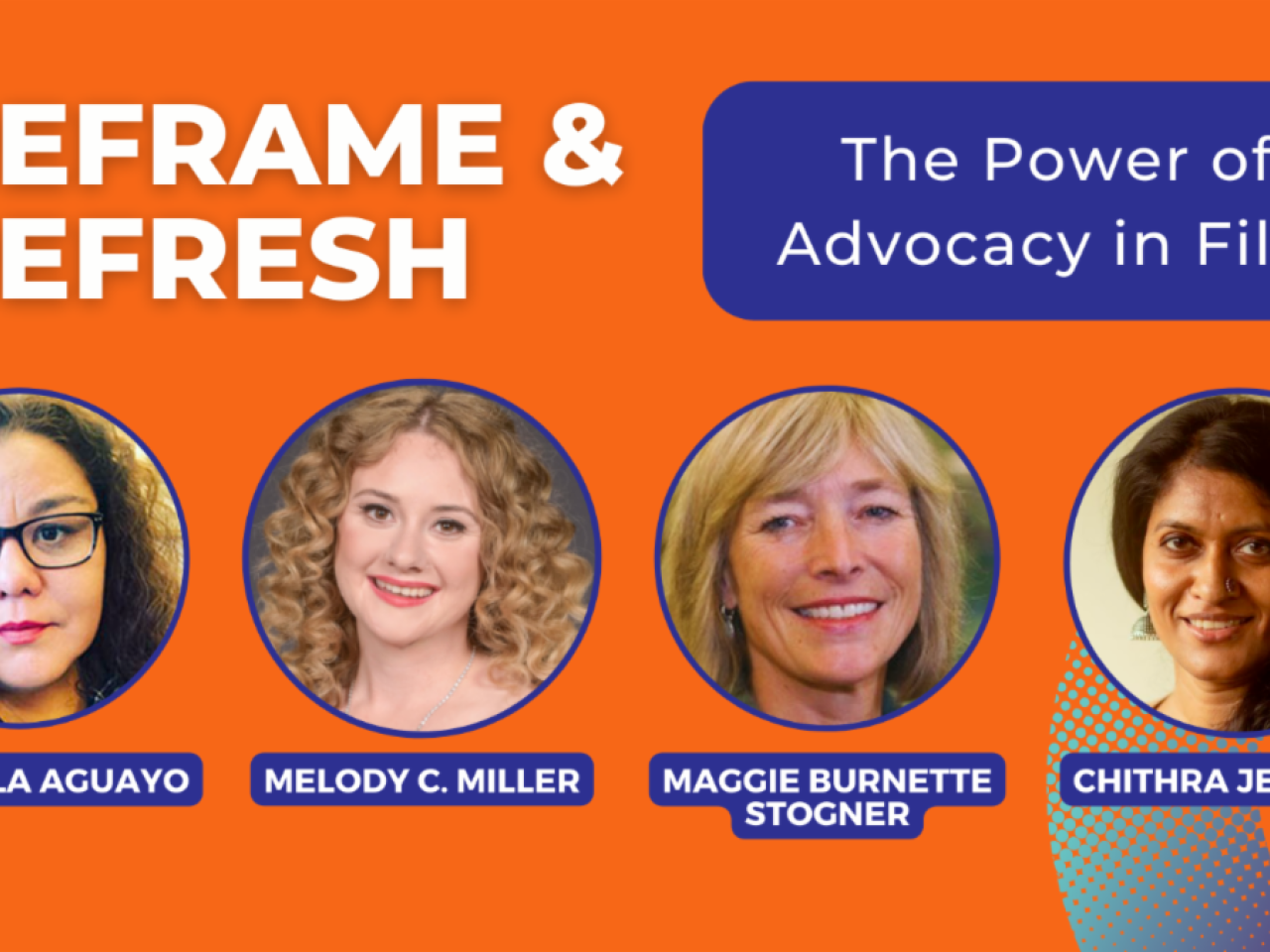Reframe & Refresh: The Power of Advocacy in Film

Join us for this engaging conversation on "The Power of Advocacy in Film”. We'll learn from the filmmakers behind "California’s Forgotten Children" and "Upstream, Downriver," about how their films have been used as tools for advocacy and change.
Location: Virtual event
Date and time: Thu, Mar 28, 2024 at 2:00 PM ET
Join us for this engaging conversation on “The Power of Advocacy in Film” with Melody C. Miller, director of California’s Forgotten Children, Maggie Burnette Stogner, director of Upstream Downriver, and Dr. Angela J. Aguayo, Associate Professor of Media & Cinema Studies; Acting Director of the Roger Ebert Center for Film Studies at University of Illinois Urbana-Champaign. The conversation will be moderated by Chithra Jeyaram, director of Foreign Puzzle.
We'll learn from the filmmakers about how their documentary films have been used as tools in fighting child trafficking and advocating for water equity and climate justice. We'll also discuss why film is an effective medium for affecting policy change. How can you utilize films to influence policy makers and stakeholders? What are other strategies using film to make long-term impact? Auto-captions will be available.
REFRAME & REFRESH is a series for the education and filmmaking community to have refreshing conversations that reframe our perspectives.
ABOUT THE SPEAKERS
Melody C. Miller is an Emmy Award-Winning filmmaker and cinematographer. With a passion for storytelling, she has produced and directed two critically acclaimed feature documentaries that have had a profound impact on audiences worldwide. “California's Forgotten Children” sheds light on an important human rights issue and received recognition for fostering a movement of change, while her uplifting documentary about one of the influential poets of the Beat Generation, ruth weiss, the beat goddess earned an Emmy® Award for Best Historical and Cultural Documentary. Melody is passionate about creating impactful and meaningful projects that not only engage but also spark important conversations and drive positive change. Through her clear creative vision in storytelling and technical prowess, Melody continues to push boundaries, leaving an indelible mark on every project she undertakes.
Maggie Burnette Stogner is the Executive Director of the Center for Environmental Filmmaking and a professor of Film and Media Arts at American University in Washington, D.C. She brings over 30 years of filmmaking experience to the Center and to the classroom. She was on staff at National Geographic TV & Film for nearly a decade where she produced, directed and wrote numerous documentaries, and was senior producer of the award-winning series Explorer. In 2005, she launched the independent media company Blue Bear Films, creating films and immersive media for world-touring cultural exhibitions for National Geographic, Smithsonian, LucasFilms, and others. She creates documentaries and outreach campaigns that inspire and inform, including the award-winning Upstream, Downriver (2022), Unbreathable: The Fight for Healthy Air (2020), In the Executioner's Shadow (2018), Gold Mountain (2016), and others.
Dr. Angela J. Aguayo is Associate Professor in the Department of Media & Cinema Studies and Acting Director of the Roger Ebert Center for Film Studies at the University of Illinois Urbana-Champaign. Angela’s scholarly research and production practice reflect an interdisciplinary focus on documentary, media studies, rhetoric, critical and cultural studies. She is focused on the possibilities for documentary to engage the process of social change, with the specific attention to collective identification and the new media technologies used in conjunction with the genre to mobilize participatory media publics. As a scholar-media artist specializing in participatory and engaged cinema, her most recent book, Documentary Resistance: Social Change and Participatory Media (Oxford University Press, 2019) investigates the political impact of documentary practice. Aguayo is also an award-winning director and producer of documentary shorts utilized in community engagement campaigns, exhibited at museums, and viewed at film festivals around the world, including such prestigious sites as Anthology Film Archives, The Art Institute of Chicago and Harvard University. Most recently, Aguayo is the founding Director of the Illinois Community Media Project, establishing efforts to support media production opportunities for underserved communities across the state of Illinois.
Chithra Jeyaram, director of Foreign Puzzle, makes films about identity, relationships, race, art, and health. A failed attempt to fund a film in India led her to quit a decade-long career as a Physical Therapist and get an MFA in film. Her work is supported by Chicken and Egg Pictures, Brown Girls Doc Mafia, Jerome Foundation, Center for Asian American Media, New York State Council for the Arts, BAVC Media Maker Fellowship, Made in New York Fellowship, American Institute for Indian Studies, Lancet, Dance Films Association, and pitched at competitive industry events like the Gotham, Sheffield Meet Market, DOC NYC, and BFI Production Finance Market. Currently, Chithra is making Our Daughters, a feature documentary that examines open adoption in America through an immigrant lens. In the near future, she hopes to direct narrative features and fantastical episodic content. She is an avid runner and has completed 14 marathons. Food is her first love.
ABOUT THE FILMS
California’s Forgotten Children
California’s Forgotten Children is a feature documentary that follows a diverse group of resilient survivors who have overcome commercial sexual exploitation as children and are changing the world by ensuring no child is forgotten. This film gives viewers the tools to combat this epidemic and empowers survivors on their path to freedom.
Upstream, Downriver takes viewers into the heart of the battle for water justice. Powerful stories with frontline community activists are interwoven with historical context. Landmark regulations enacted fifty years ago significantly reduced water pollution in the U.S., but failed to serve disadvantaged communities that are hardest hit by today’s climate crisis.